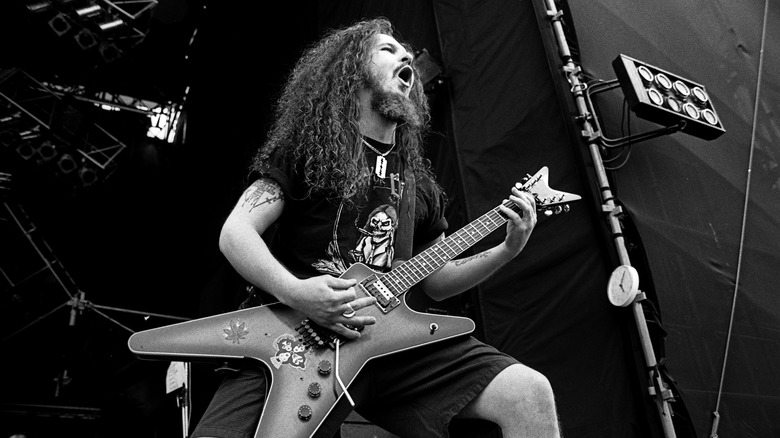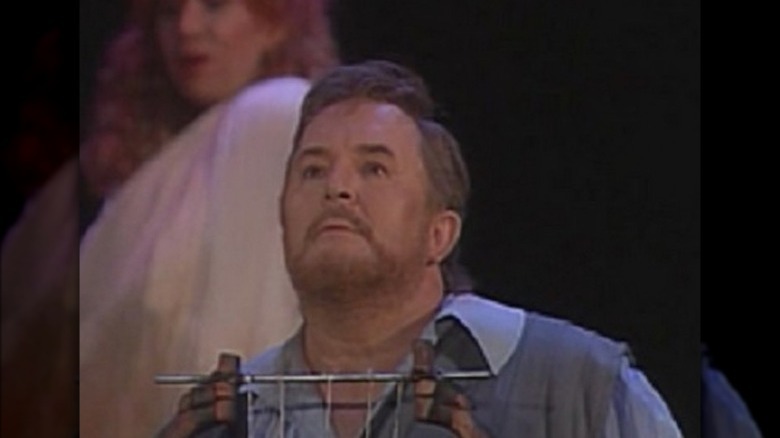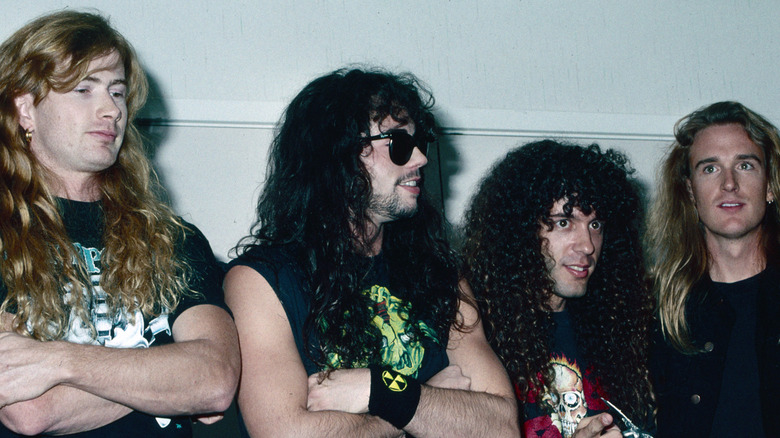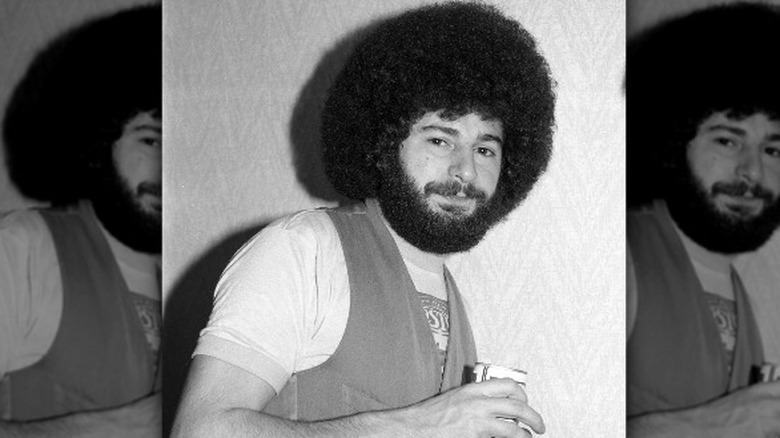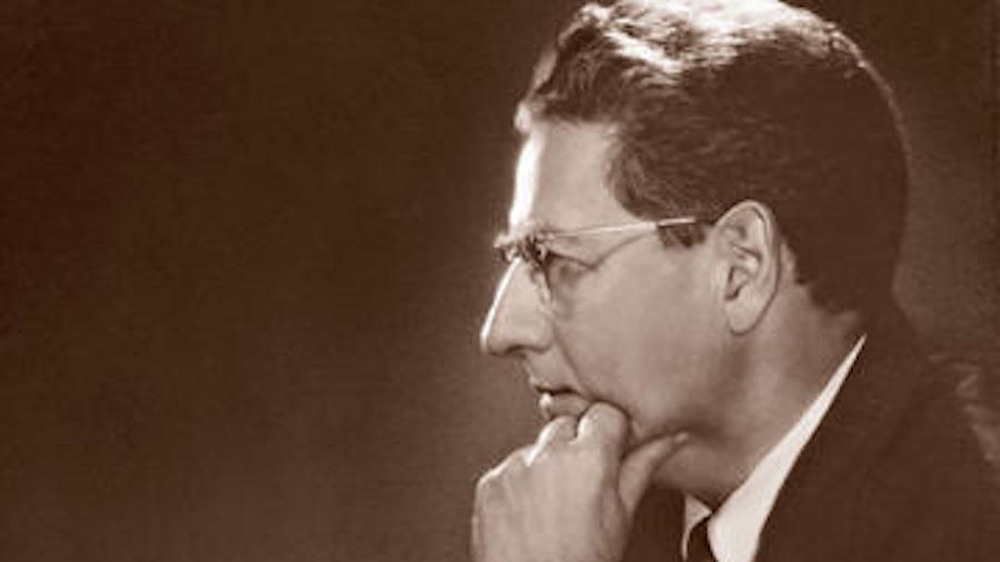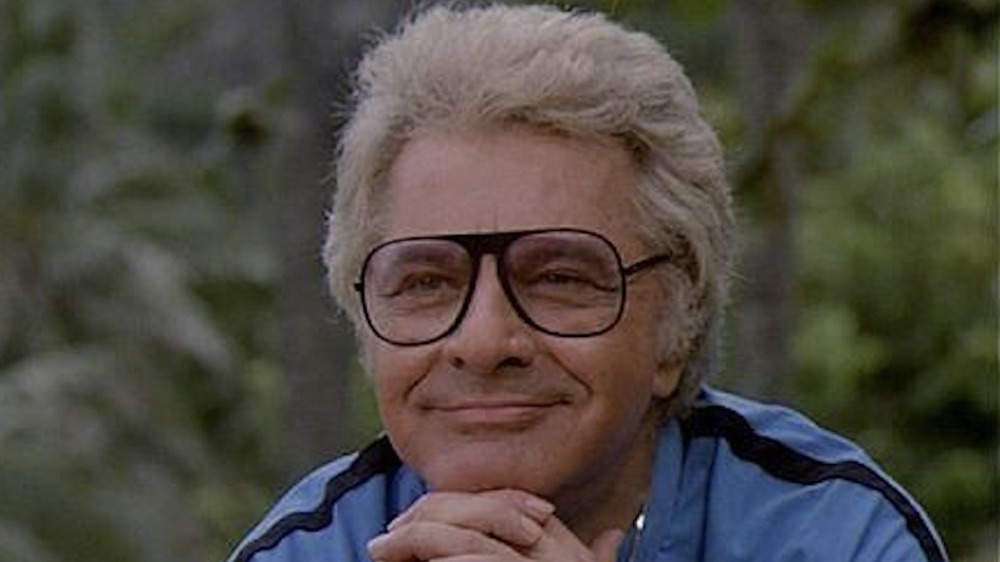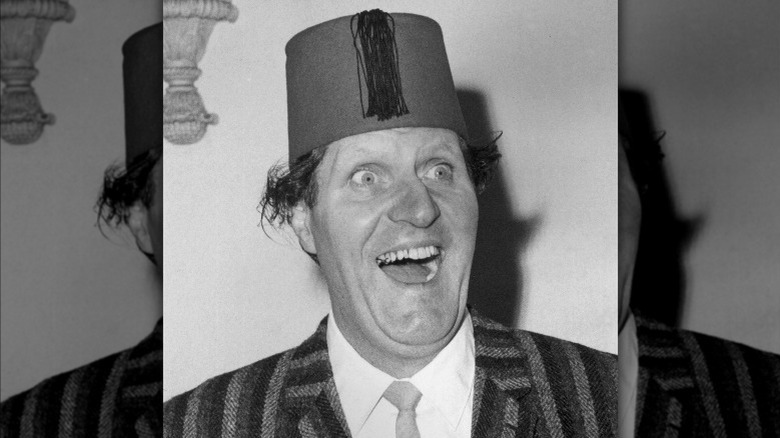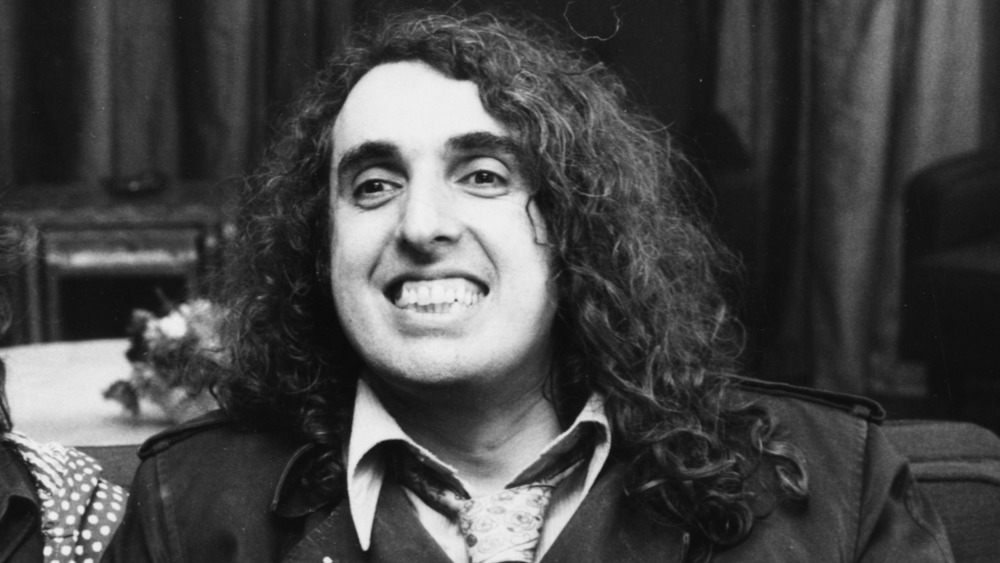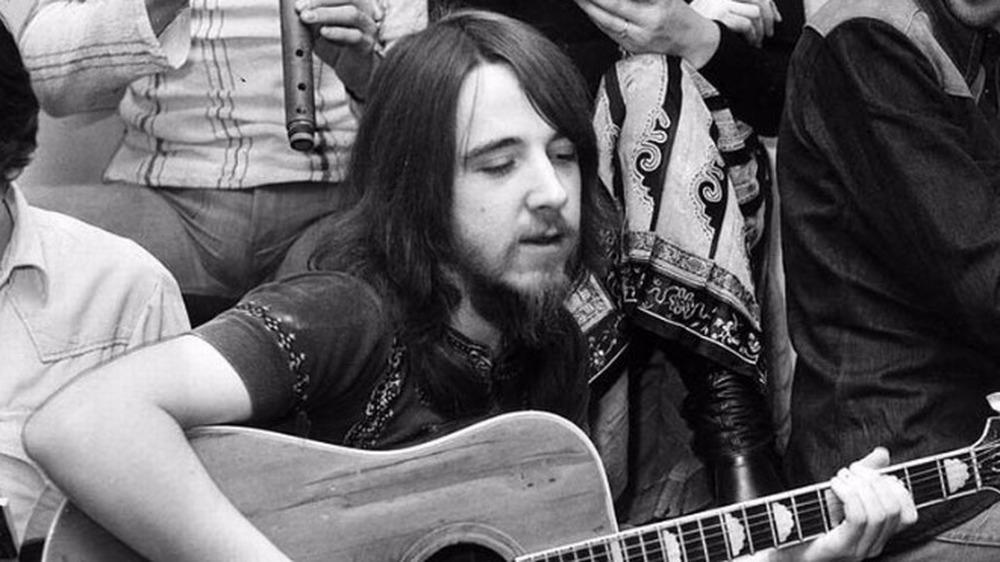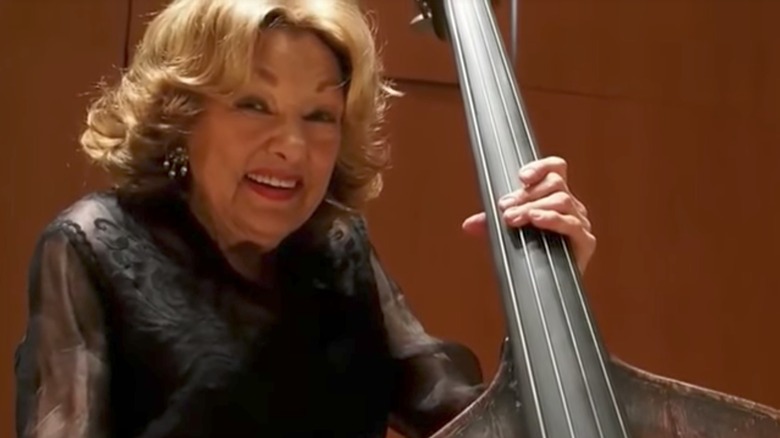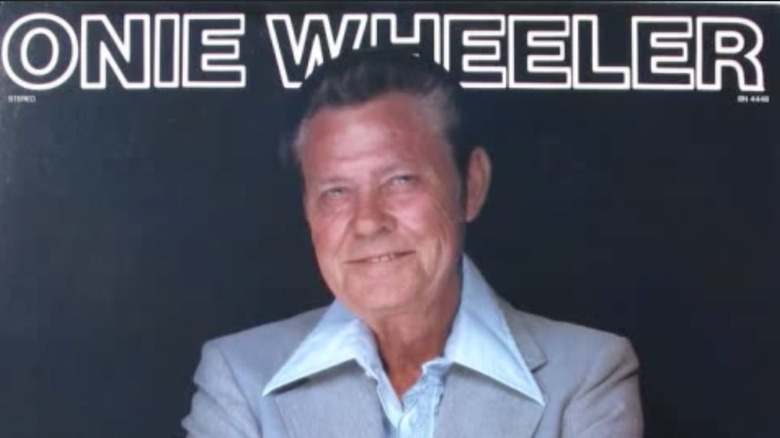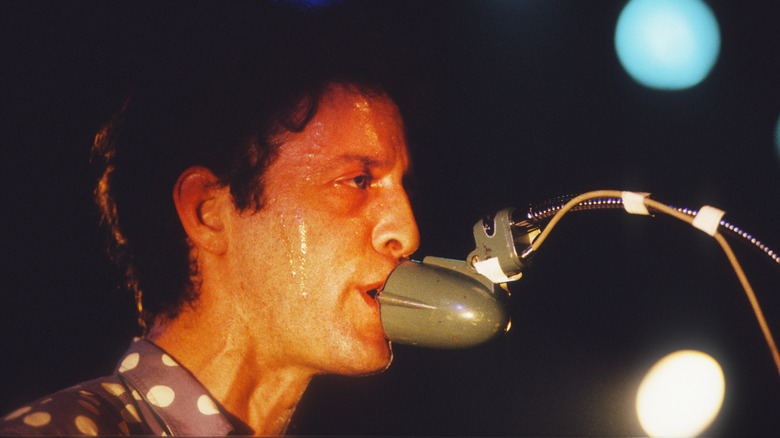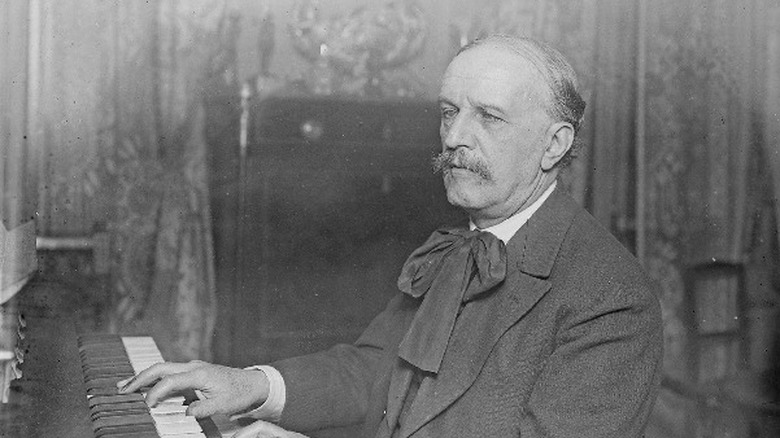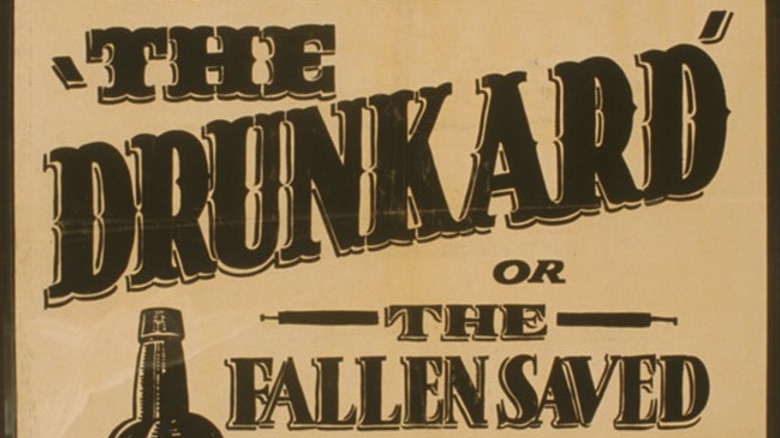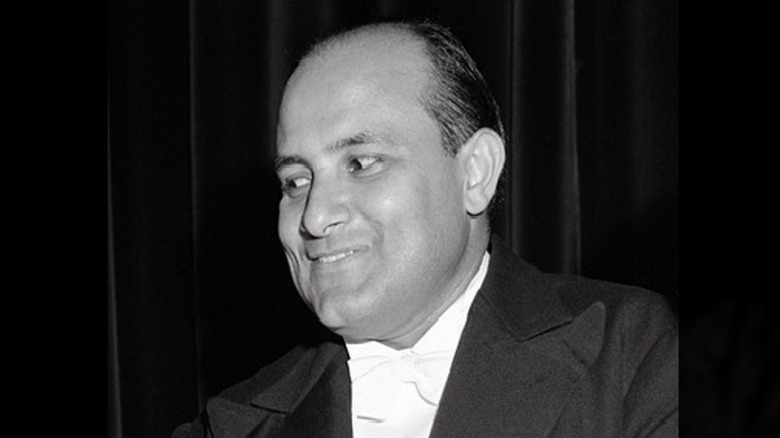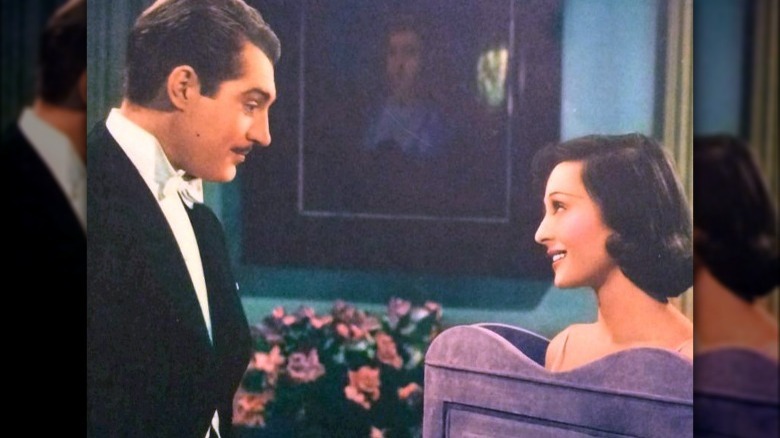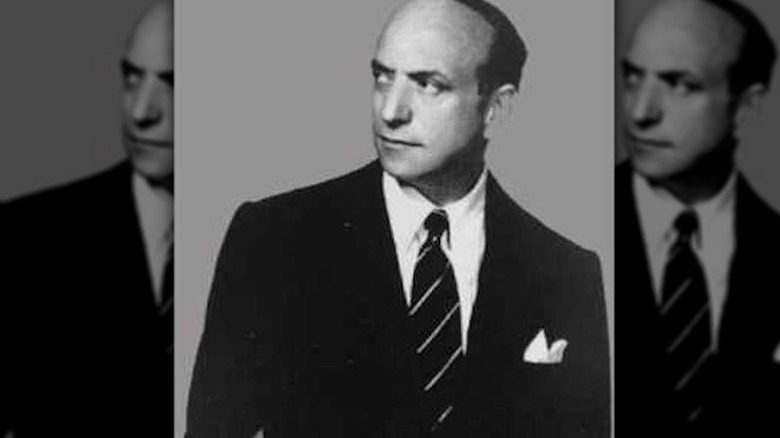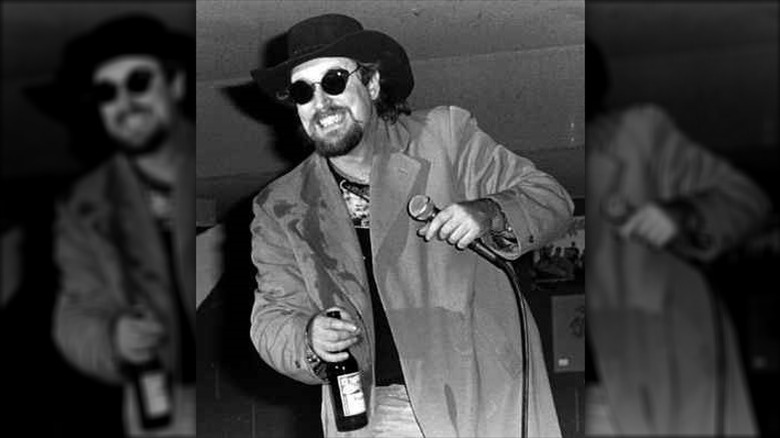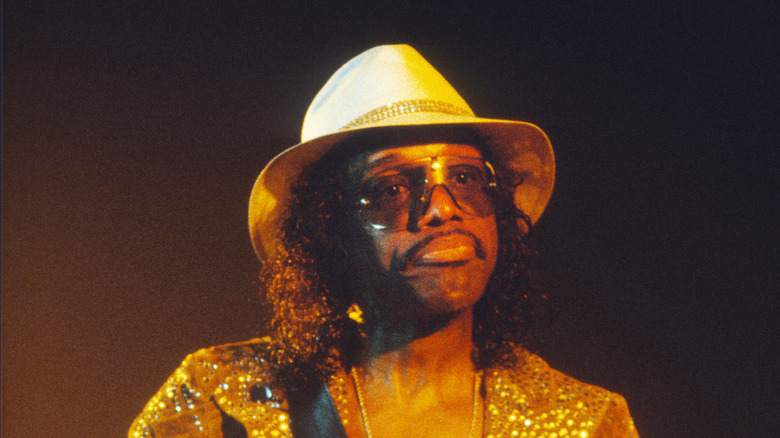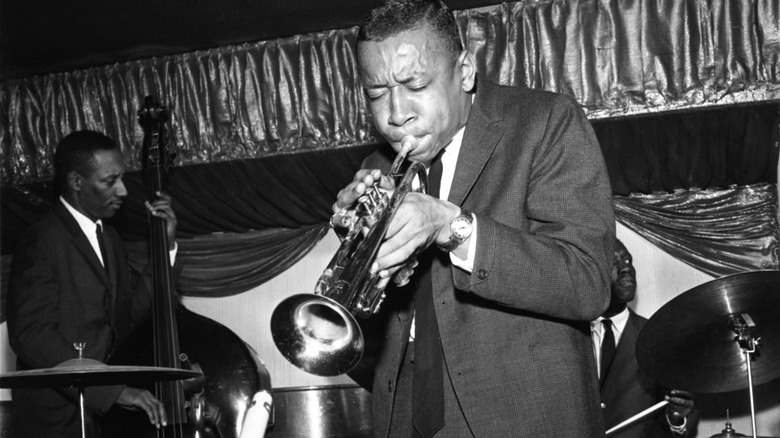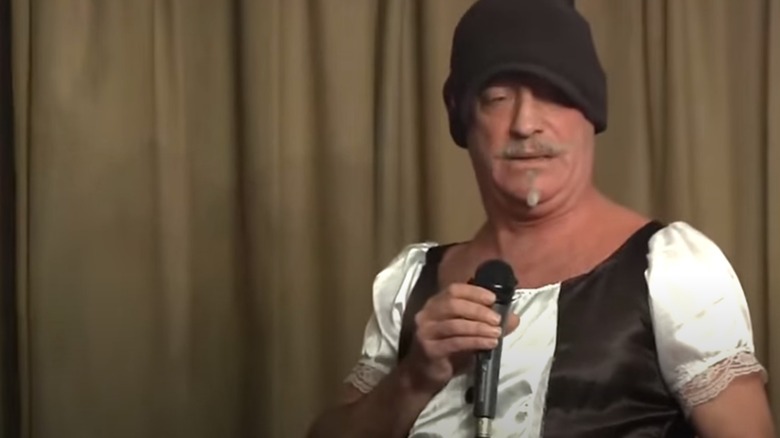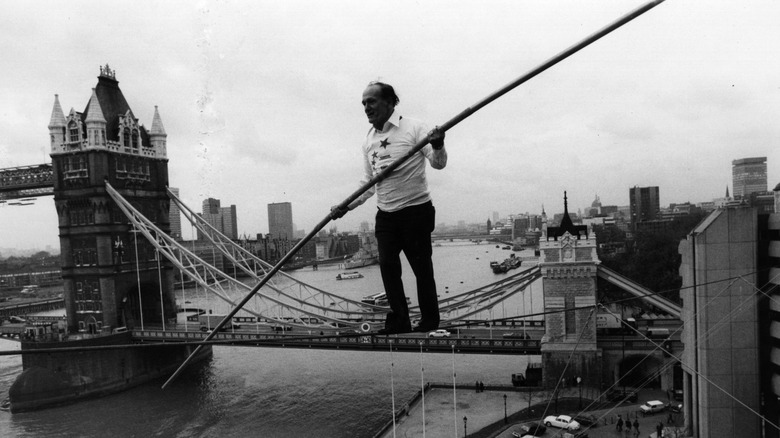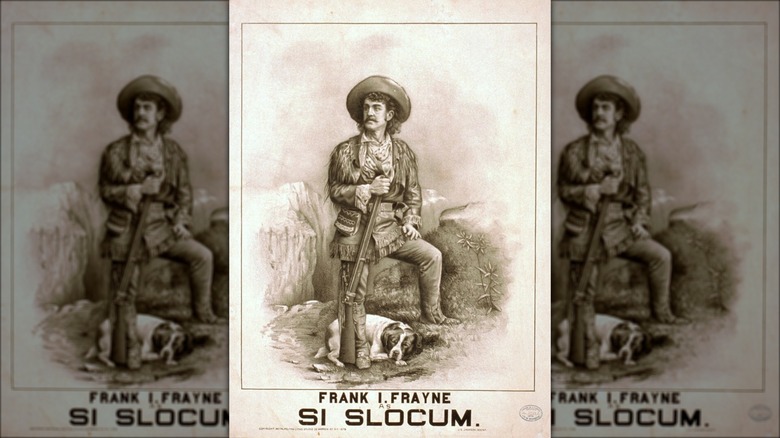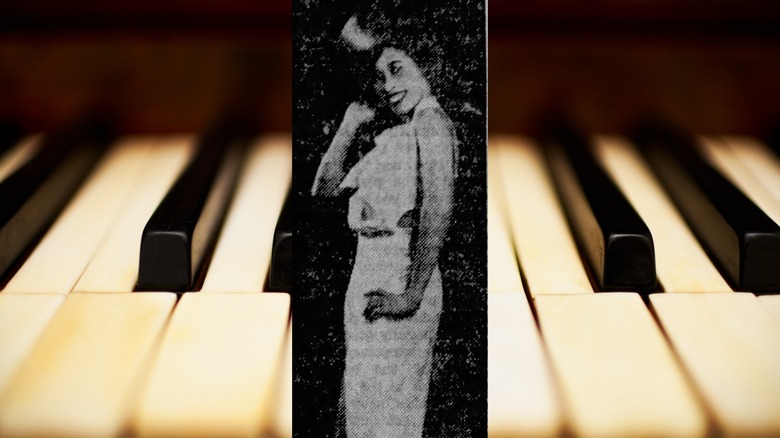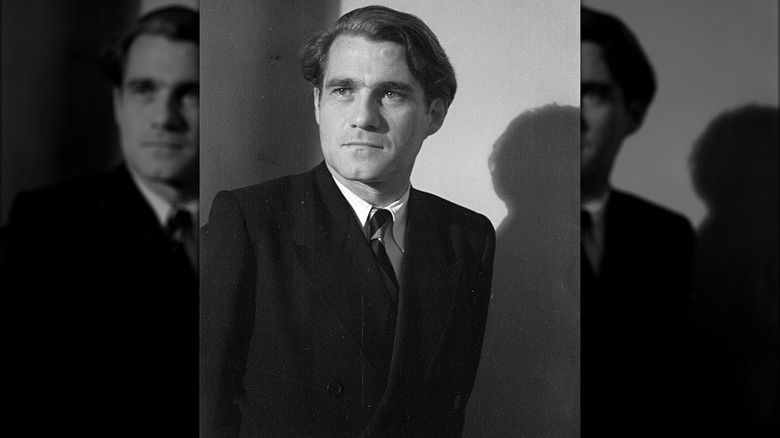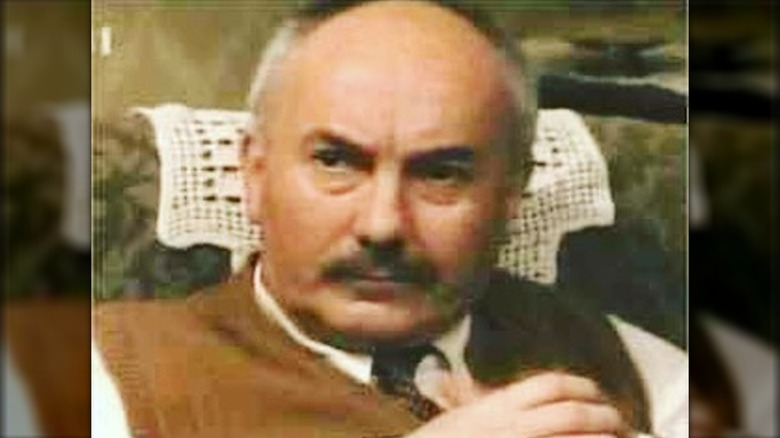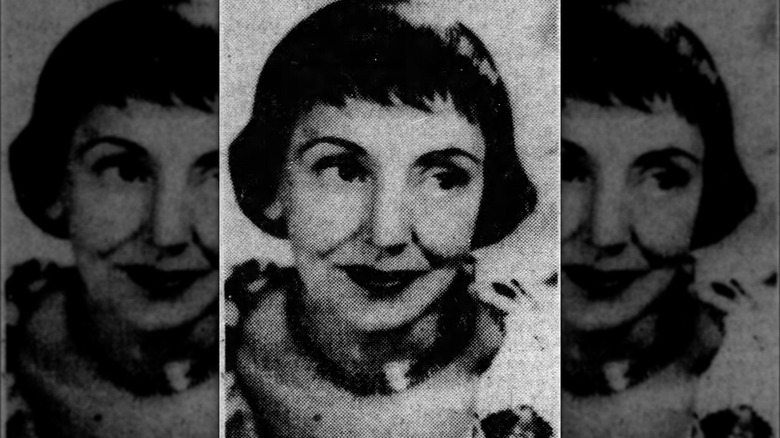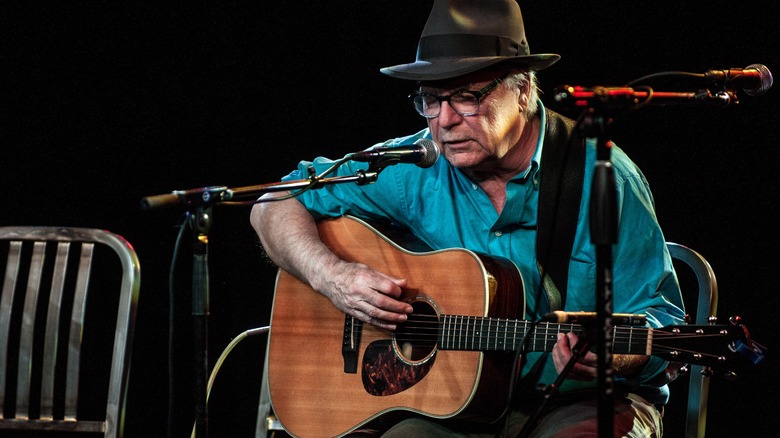Performers Who Died In Front Of Their Audiences
It's almost a blessing to, as the old saying goes, die doing what you love. That's all well and good, to get to enjoy the things that make you happy up until the final curtain, even if it involves the thrill of dancing with the grim reaper, as acts like tightrope walking and high-wire gymnastics often do. But occasionally, this happens in a very real and literal sense, with death tragically happening in the middle of a performance. And if it's a musician, actor, or television performer doing what they do best before a live audience, they die in front of a whole bunch of horrified witnesses who could be traumatized forever.
From death-defying acts that went horribly wrong to professional fighters who fought to death to aging musicians who never finished their last set, here are some famous folks who literally worked until the end, dying while on stage or on live television.
'Dimebag' Darrell Abbott
Part of what makes a concert so exciting, particularly one in a small club or venue, is the intimacy between band and audience. Nothing separates the musicians from the crowd. The downside? Sometimes, there's less emphasis on security. On December 8, 2004, the rock band Damageplan — formed after the breakup of the popular metal band Pantera by Pantera's guitarist, "Dimebag" Darrell Abbott — took the stage at Alrosa Villa, a club in Columbus, Ohio.
A 25-year-old ex-Marine named Nathan Gale sneaked into the club with a gun and made his way onto the stage, opening fire on Abbott just 90 seconds into Damageplan's set. Abbott, 38, died that night, and so did three other people: concert-goer Nathan Bray, band crew member Jeff Thompson, and Alrosa Villa employee Erin Halk. Gale, whose mother said (via CBS News) he was discharged from the military due to mental health issues, also died — shot and killed by a police officer. Though several theories about Gale's motivations were floated, none of them could be conclusively proven.
Richard Versalle
Operas frequently and loudly portray tragedy, but neither the performers nor the audience expect it to cross over into real life, and certainly not in the middle of a performance. But one day, at the Metropolitan Opera in New York, that's what happened to opera singer Richard Versalle, who broke the fourth wall in the most tragic way possible.
In January 1996, Versalle was performing in "The Makropulos Case," playing the role of Vitek, an old man who works in a law firm. In the opera's opening scene, Versalle stood perched high atop a library-style ladder to put away a case file. Versalle sang the line, "Too bad you can only live so long," and then, inadvertently proving his point, suddenly fell off the ladder. And the reason for his unscripted fall? The 63-year-old tenor, whose career took him over Europe and beyond, had reportedly suffered a fatal heart attack that caused him to lose balance.
Nick Menza
There's nothing more metal than dying on stage while playing metal, and even before his untimely death, Nick Menza was about as metal as it gets. In fact, he was once a member of Megadeth (pictured above, Menza second from left), being behind the kit for the major metal band throughout the '90s, playing on highly regarded albums like "Rust in Peace" and "Countdown to Extinction." Apart from Megadeth, Menza played with several bands, including Chodle's Trunk, Fear Assembly, Orphaned to Hatred, and OHM.
It was in May 2016, during a gig with OHM — a band founded by one of his former Megadeth bandmates, guitarist Chris Poland — in a Los Angeles jazz club called the Baked Potato, that Menza's heart gave out. Suffering what emergency responders reportedly considered to be a massive heart attack, the 51-year-old drummer collapsed onstage during the third song of the band's set, and he was pronounced dead upon arrival at a nearby hospital.
Sib Hashian
As an original member of Boston, drummer Sib Hashian played on two of the best-selling rock albums of the '70s: "Boston" (17 million copies sold) and "Don't Look Back" (7 million moved). But that was then and this is now, and Boston wasn't as in-demand as it once was.
In recent years, Hashian joined the classic rock nostalgia circuit and the Legends of Rock Cruise, where music fans on board a cruise ship were entertained by bands that included various and assorted members of Foreigner, Kansas, the Beach Boys, Boston (obviously), and more of your dad's favorite bands. But in 2017, Hashian made his last voyage, setting off from Miami in March that year, with the ship due to sail a number of Caribbean destinations. During a performance at sea, the 67-year-old Hashian collapsed behind the drums, and despite their best efforts, onboard emergency responders were unable to revive him.
Jerome Rodale
In the mid-20th century, Jerome Rodale (also known as J.I. Rodale) advocated some health habits considered pretty out-there at the time, but which are totally normal now: eating foods that weren't loaded with antibiotics or eating local. Rodale wrote and spoke for years about how those and other healthy practices would extend his lifespan.
On a taping of ABC's "The Dick Cavett Show" on June 7, 1971, the 72-year-old longevity guru claimed that he "never felt better" and that he'd "live to a hundred" (via The New York Times). Unfortunately, Rodale didn't quite make it to 100 — he died a few minutes after making that statement. Rodale stayed on stage while Cavett interviewed another guest, staying quiet, until he let out some kind of ghastly, guttural noise. He'd gone pale and his mouth hung open, and ... Rodale died right there on the set of "The Dick Cavett Show" in front of a live studio audience.
Col. Bruce Hampton
Whether you love or hate jam bands like the Grateful Dead, Phish, and the String Cheese Incident, or their crunchy, 45-minute-long guitar noodlings, you've got Col. Bruce Hampton to thank. Known as the "grandfather of the jam band scene," Hampton tirelessly played with lots of bands, including the Quark Alliance, the Late Bronze Age, and the Hampton Grease Band. In May 2017, his many friends, collaborators, and fans converged on Atlanta's historic Fox Theatre for "Hampton 70: A Celebration of Col. Bruce Hampton" — which would turn out to be Hampton's last performance.
Staged the day after Hampton turned 70, the all-star jam session celebrated the man and his music. As a teenage guitar wizard named Taz Niederauer showed off some tasty licks, Hampton fell to his knees, resting his arm on a speaker on stage. Niederauer and members of Blues Traveler and Widespread Panic played "Turn on Your Love Light" while totally unaware that Hampton's light had just gone out. As banjo player and concert participant Rev. Jeff Mosier said in a Facebook post, he thought Hampton had initially fallen to his knees to do a "we're not worthy" to Niederauer. Nor was he taking a little break: Hampton had collapsed and died.
Dick Shawn
In April 1987, comedian Dick Shawn put together a full evening of entertainment for the audience of 500 or so people that paid to see him perform at UC San Diego. First, he did a sketch where he played a disembodied head on a dinner table, then he comically danced out of time to some music. Next, Shawn launched into a routine about the end of the world, during which he lay down on the stage and stayed completely still. The audience thought it was part of the bit, that Shawn was pretending to be dead. The end of the world is about people being dead, after all.
Tom Wartelle, a guy in that audience, told the LA Times, "There were comments from the audience like, 'Take his wallet'" and that "it all blended in very well" with Shawn's act. But then, after five minutes of Shawn not moving, the heckles and laughter pretty much stopped. A doctor rushed onto the stage, tried to find a pulse, and then flipped Shawn onto his back. The audience was ordered out while Shawn received CPR, and an ambulance arrived in short order to take Shawn to the nearest hospital. The revival attempts were unsuccessful: Less than two hours after Shawn first took the stage, he was pronounced dead at age 57.
Tommy Cooper
In April 1984, Welsh prop comedian and magician Tommy Cooper appeared on the variety show "Live from Her Majesty's," broadcast live to viewers throughout the U.K. from Her Majesty's Theatre in London. Cooper did his famous magic cloak skit, in which he wore a huge gown, stood in front of a curtain, and had an assistant pass him increasingly larger objects that he'd "magically" pull out from under his gown. Cooper's assistant that night was "Live from Her Majesty's" host Jimmy Tarbuck, who told Wales Online that the bit was supposed to end with Tarbuck emerging from the curtain with a stepladder and handing it to Cooper, because it was too big to fit under the dress. (Cooper's act was a little corny.)
But then Cooper did a bit of what Tarbuck thought was some improvised physical comedy — a Cooper habit. After a "lovely assistant" came onto the stage, Cooper suddenly fell hard onto his rear end. The in-house audience laughed, but this wasn't comedy — it was tragedy. The 63-year-old Cooper had suffered a heart attack on live TV. The director sent the show to an unscheduled commercial break, so home viewers wouldn't see Cooper's lifeless body getting pulled through the curtain. He was taken to a hospital and pronounced dead upon arrival.
Owen Hart
Owen Hart was among the most popular and dynamic wrestlers in the WWE in the 1990s (and, alongside his brother, Bret "The Hitman" Hart, part of a wrestling legacy). He was a major draw at the May 1999 "Over the Edge" pay-per-view event, set to appear as an obnoxious superhero character, under the guise of which he'd be lowered from the rafters into the ring via an elaborate wire system. But the rigging tragically malfunctioned, sending the "Blue Blazer" plunging 78 feet. He fell onto the top rope, and then into the ring, with fatal consequences.
The 16,000 strong in Kansas City's Kemper Arena went quiet, and announcer Jim Ross horrifyingly had to tell the crowd that Hart's fall was not scripted, a stunt, or fake in any way. (Those watching the event on TV didn't see the fall — the broadcast was showing highlights of Hart's past matches to build up drama before his big entrance.) Hart was pronounced dead at a local hospital. He had recently celebrated his 34th birthday.
Irma Bule
Remember when Britney Spears danced with a giant snake draped around her neck during the 2001 MTV Video Music Awards? Now, imagine if that cobra had not been properly handled, bit Spears, and killed her. Sadly, this is actually what happened to an Indonesian singer named Irma Bule.
In 2016, while performing in Karawang, Indonesia, the 29-year-old was handling a live snake "stage prop" she'd used for years. During just her second song, the snake — a cobra — bit Bule on the thigh. She didn't think much of it, assuming that someone had defanged or de-venomed the cobra, and she was used to performing with non-venomous snakes such as pythons, with the added precaution of their mouths being taped shut. On this occasion, none of these safety measures were in place, and Bule had been told to perform anyway. Around 45 minutes after being bitten, Bule was still doing her show when she started vomiting and seizing. She was pronounced dead at a local hospital.
Tiny Tim
Tiny Tim was one of the most unique performers to ever score a hit record. A tall (hence the ironic stage name), stringy-haired man with a high, vibrating, lilting voice, his version of an old standard called "Tip-Toe Thru' the Tulips with Me" hit No. 17 on the Billboard pop chart in 1968. (Adding to the bizarro, Tiny Tim accompanied himself on the ukulele.) A year later, the unlikely celebrity married a 17-year-old fan, Vicki, on The Tonight Show, a moment seen by 21.4 million households, then a ratings record for Johnny Carson.
Tiny Tim was a memorable guy, and he died as he lived: entertaining others. On November 30, 1996, Tiny Tim played a benefit show for the Women's Club of Minneapolis. While singing "Tip-Toe Thru' the Tulips with Me," Tiny Tim abruptly stopped playing, then told his wife (Susan Gardner; he and Vicki had divorced years earlier) he didn't feel well. Then the 64-year-old performer collapsed, dying a few hours later at a Minneapolis hospital, likely of cardiac arrest.
Barbara Weldens
French singer Weldens was a star on the rise — only to have her career (and life) end because of a freak stage accident. In 2017, the 35-year-old singer had just released her first album, "Le grand H de l'homme," and was a big draw to the Léo Ferré Festival, performing at a church in the village of Goudron, France. According to eyewitnesses, Weldens put on a terrific show and earned a standing ovation. She was soaking it all in when she suddenly lurched forward and fell lifeless to the ground, due to a sudden cardiac arrest.
While early reports of what happened could only provide speculation, an electrical malfunction was initially blamed for why Weldens' heart stopped. An autopsy confirmed her cause of death as being electrocution, and as to how she was electrocuted in the first place, it's notable that Weldens performed barefoot, and may have stepped on a live wire.
Hijo del Perro Aguayo
In March 2015, two of the biggest stars of the AAA — the Mexican wrestling federation equivalent to the WWE — met in the ring: Hijo del Perro Aguayo (Pedro Aguayo Ramirez) vs. Rey Mysterio Jr. (Oscar Gutiérrez). Aguayo was arguably the most well-known rudo, or villain, in the AAA. During the match, the legendary Mysterio delivered a powerful flying kick, sending Aguayo careening into the ropes. The wrestler's head hit the ropes, and he appeared to have suffered snapped vertebrae.
After he lay in the ring unresponsive, Mysterio and the referee sensed something had gone very wrong and summoned help. The on-call doctor took an agonizingly long 80 seconds to reach and treat Aguayo, but it was all too late. According to the Tijuana Wrestling Commission, the cause of death was a heart attack, triggered by a cervical stroke, which occurred when the wrestler's neck broke. He was 35 years old at the time of his death.
Les Harvey
There are all kinds of potential dangers on stage. Stage fixtures such as lighting could fall and hit a performer, or a musician could slip and fall off the stage, to name only two possibilities. There's also a lot of electricity going on to power all those electric guitars and amps, and that's what killed Les Harvey, guitarist for the up-and-coming Scottish blues-rock band Stone the Crows.
Prior to the start of a concert in Swansea, Wales, on May 3, 1972, Harvey was tuning up his instrument in front of about 1,200 fans, and then did something perfectly normal for a performing artist: he grabbed a microphone. Unknown to him, this was to be a fatal mistake, as it hadn't been properly grounded, and a volatile, fatal jolt of electricity shot through his body. He died at the hospital, and, like so many other tragically lost stars, Harvey died young, at just 27 years old.
Sam Patch
When a professional daredevil dies in front of an audience, it's just as horrifying and sad as when an actor or singer dies, but perhaps not as surprising. In 1827, Sam Patch became one of the first famous daredevils, regularly jumping off a ledge over Passaic Falls in New Jersey into the water below. As time went on, his jumps became ever more ambitious, so he attracted larger and larger crowds. In 1829, Patch and his team announced the entertainer's "last jump": On Friday, November 13, he would hurl himself 125 feet off a platform overlooking the High Falls of the Genesee River in Rochester, New York.
Now, "last jump" was supposed to mean it was Patch's final attempt of the season. But fate or the universe or something took that word far too literally. According to a report of the jump from the New York Evening Post, in mid-descent, Patch's body "began to droop, his arms were extended, and his legs separated." In other words, his form was way off ... and then he hit the water wrong. He never emerged. Four months later and 6 miles downriver, Patch's body finally surfaced in a block of ice. An autopsy concluded that Patch had suffered a ruptured blood vessel mid-fall, due to the sudden shock of the cold November air.
Jane Little
Dying while living out one's lifelong passion may very well be sad and shocking for witnesses, but yet some may consider such tragedy to carry a certain poignancy. Such may be the case with musician Jane Little, a double-bass player who joined the Atlanta Symphony Orchestra in 1945 at the age of 16, and stayed with the group for more than seven decades. In February 2016, Guinness World Records recognized Little for a big achievement — 71 years with the ASO, a record for orchestral musicians.
Just a few months later, in May 2016, Little was playing in a symphony pops concert called "Broadway's Golden Age," a collection of show tunes. Despite undergoing cancer treatment at the time, and reportedly not in the best of health, Little was determined to keep performing. Near the end of "There's No Business Like Show Business," Little, 87, collapsed while playing her bass. She was carried backstage and was declared dead soon afterward.
Onie Wheeler
Back in the '50s and '60s, Onie Wheeler was one of the great country music sidemen, back when they still called it "country and Western music." While he recorded lots of solo material, the guitarist and harmonica player backed Johnny Cash, Ray Acuff, and George Jones, among others, and the legendary Lefty Frizzell had a huge hit with a song Wheeler wrote called "Run 'Em Off." In the '70s and '80s, Wheeler lived in Nashville and performed regularly at the city's iconic Grand Ole Opry. There's probably no better way for a true-blue country music lifer to go out than while performing at the Opry, which is what Wheeler did.
At the beginning of 1984, Wheeler had an aneurysm that required hospitalization and several months of recovery, but Wheeler was back before an audience soon enough. In May that year, while on stage at the Opry and recording the Rev. Jimmie Snow's radio show "Grand Ole Gospel Time," Wheeler collapsed and died.
Mike Scaccia
Mike Scaccia and his guitar stood at the forefront of two innovative sub-genres of hard rock that exploded in the 1980s: thrash metal and industrial metal. As far as the former goes, he founded the band Rigor Mortis in 1983, and for the latter, he joined Ministry in 1989, invited by band leader Al Jourgensen after the band moved from synth-pop to a hard-charging, guitar-heavy electronic-influenced style. As Ministry's main guitarist, he appeared on the band's best-selling album, "Psalm 69: The Way to Succeed and the Way to Suck Eggs" and its two best-known songs: "Jesus Built My Hotrod" and "N.W.O."
Scaccia never forgot Rigor Mortis, however, and on December 22, 2012, he played at the Rail Club in Fort Worth, Texas, as part of a 50th birthday party for the band's singer, Bruce Corbitt. While Scaccia was performing, he suddenly collapsed. He was rushed to a hospital, where he was pronounced dead. According to a medical examiner's report, the 47-year-old guitarist died of a sudden heart attack triggered by heart disease.
Yu Zhao Gu
China-born husband-and-wife violinists Yu Zhao Gu and Ying Zhao moved to the Houston area and, among other professional orchestras, joined the Symphony of Southeast Texas in the mid-1990s. That became their "home orchestra," and they were regular contributors to the string section over the years.
The two were also stand partners, and so Zhao was right there on April 6, 2019, when, during the symphony's final performance of the season at a theater in Beaumont, Texas, her husband suddenly slumped out of his chair and slid to the floor. The musicians immediately stopped playing, and several doctors in the audience rushed to the stage to help, as did a cardiologist in the orchestra. CPR was administered as paramedics made their way to the concert hall. The violinist was rushed to a nearby hospital, but it was too late: Yu Zhao Gu was pronounced dead at the age of 60.
Mark Sandman
Morphine was one of the most unique alternative rock bands of the '90s, which is to say their music was challenging and unsettling. That's due in large part to singer and bass player Mark Sandman, who pioneered a slow, droning playing style, which added a spooky and unnerving element to Morphine's tunes. Also spooky and unnerving was the deadly heart attack he suffered while on stage.
Morphine was performing in the Giardini del Principe festival outside Rome in 1999, when the 46-year-old and otherwise healthy Sandman suddenly stopped playing and fell to the ground. A few minutes later, while in an ambulance en route to a hospital, he was pronounced dead. Thousands of spectators and fans were left stunned, as was his band, with their manager summing up the mood by saying (via the Los Angeles Times), "We're devastated ... We don't even know what to say. We're all in shock."
Louis Vierne
In the early 20th century, Louis Vierne held just about the most prestigious job possible for a professional church organist: resident organist at the legendary Notre Dame Cathedral in Paris. Despite drawing crowds that wanted to hear Vierne's otherworldly organ work, particularly on his own compositions (he wrote six symphonies), the Catholic Church clergy that ran Notre Dame decided in 1937 to discontinue all organ recitals. They at least let Vierne play for the people one final time, on June 2, 1937.
Vierne was the Elvis Presley of early 20th-century organists, and had experienced a string of tragically bad luck to rival his success. His wife cheated on him, one of his sons died from tuberculosis, and the other died fighting in World War I. A fall shattered his leg and ankle so badly that he had to relearn his organ pedaling technique, and the stress of it all made him a three-packs-a-day smoker, who also relied on heart pills, tranquilizers, and sleeping pills.
About 3,000 people amassed for Vierne's last concert at Notre Dame... which turned out to be his last concert ever. After playing an original piece, he said (per HuffPost) to his assistant standing nearby, "I'm going to be ill." He then played one low, continuous note ... and didn't stop. He'd died of a heart attack sitting in his favorite seat.
Edith Webster
Webster was a star of the suburban Baltimore theater scene. At the Towson Moose Lodge in November 1986, she performed a role she'd done more than half a dozen times before — the grandmother-in-law of the titular drunkard in a musical melodrama called "The Drunkard." In the long-running play, which dates back to the 19th century, the character Webster played dies at the end of the first act, right after singing a ballad called "Please Don't Talk About Me When I'm Gone." Webster finished the song, clutched at her heart, and her character died as the stage lights blacked out. Unfortunately, so did Webster, who at that moment had a heart attack, crumpled to the floor, and died.
It was a poignant moment to perish, as the audience loudly clapped in praise of her last performance, having no idea at first what had just happened. The play's director, Richard Byrd, told United Press International (via the Los Angeles Times) that the last thing Webster heard was "tremendous applause. Hearing that, she died."
Leonard Warren
Operas are full of sad, dramatic, even tragic moments — that's kind of opera's whole thing. Baritone Leonard Warren, one of the most famous American opera singers of all time, added to opera's inherent darkness, not to mention its lore, by dying on stage.
In March 1960, Warren was singing the role of Don Carlo in the opera "La Forza del Destino" by the Italian composer Giuseppe Verdi. At about 10 p.m., Warren's voice and body gave out. He fell to the stage floor of the Metropolitan Opera House in New York City immediately after finishing the aria "Urna fatale del mio destino," which translates appropriately to "fatal urn of my destiny." Less than half an hour later, the singer was pronounced dead. His cause of death was determined to be a heart attack.
Alan Marshal
Alan Marshal, a theatrically trained actor from Sydney, Australia, put together a solid career in the 1930s and '40s as a character actor (pictured above, left) and supporting player. He specialized in playing villains, soldiers, and the not-quite-right-for-her-guy that the main female character is with at the beginning of the movie, before leaving him to be with her true love. Marshal stayed true to his theatrical roots, performing in plays throughout his career. In fact, his final role would be on stage.
Marshal co-starred in "Sextette," a sexy farce written by and starring silver-screen sexpot Mae West. The 52-year-old actor was delighting an audience at the Edgewater Beach house in Chicago, up to the moment when he keeled over from a heart attack. Undeterred, he somehow managed to temporarily gather his strength and finish his performance, but after the play was over, Marshal was later found dead in his hotel bed.
Simon Barere
In 1951, famed Russian pianist Simon Barere sat in front of his instrument before a huge audience at Carnegie Hall. Barere was a featured musician performing for the first time with the Philadelphia Orchestra, and for the first two minutes and change of the concerto, his playing was masterful, as usual. But then that's when audience members noticed Barere's tempo growing inconsistent, which is to say nothing of the sour notes. Barere's missteps subsided when he stopped playing entirely and slumped forward, his head crashing into the keys, before he rolled off the bench and hit the floor.
A doctor was, in fact, in the house, and he ran up and helped carry Barere backstage. While an anxious Swedish tenor, Set Svanholm, delivered the next performance, a trio of doctors furiously tried to revive the 54-year-old Barere in his dressing room. Despite their efforts, he was pronounced dead before an ambulance arrived, the cause being a stroke.
Country Dick Montana
While they recorded a slew of well-received albums on major labels, the Beat Farmers were regarded as one of the best bar bands in the world, performing at whatever intimate venue would take them. They were "honky-tonk anarchists," and a definitive band of the 1980s "cowpunk" scene, combining countrified roots rock with a punk attitude. Country Dick Montana, who usually sat behind the drum kit, formed the band in 1983 after playing with some other bands and running a San Diego record store. Cowboy Dick was an imposing presence in a cowboy hat and a duster, and he'd usually take the mic for at least one song per show — often a quirky novelty song about the delights of drinking.
On November 8, 1995, Montana and the Beat Farmers played in front of a packed house at the Longhorn Saloon in Whistler, British Columbia. At the end of the song "The Girl I Almost Married," Montana collapsed onto the drums. The other band members moved into the next song but stopped when they noticed Montana was silent. Road manager Tom Ames ran onto the stage and helped Montana to the ground. By the time paramedics arrived a few minutes later, 40-year-old Country Dick was dead from what was later ruled to be an acute aneurysm.
Johnny Guitar Watson
Johnny Watson was so skilled at playing his instrument — and in so many different ways — that his nickname was literally "Guitar." After testing out the blues scene as a teenage piano player in Houston, he switched to guitar in the 1950s and started grinding out influential electric blues classics. Watson reinvented himself in the 1970s as one of the best and earliest purveyors of the music genre known as funk. Also a '70s style icon, with his wide-brimmed hats, flashy jewelry, and giant sunglasses, Watson brought funk to the masses with groovy, soulful, guitar-powered tunes like "Superman Lover," "A Real Mother for Ya," "Lover Jones," and "Ain't That a B****." Always an innovator, Watson's 1980 single "Telephone Bill" is among the first-ever rap songs.
Watson, who'd slowed down his career pace since the early '80s, toured in 1996, and on May 17 of that year, played a gig in Yokohama, Japan. Shortly after taking the stage and delivering some stage chatter in Japanese (which he claimed to speak in "Ain't That a B****"), Watson collapsed and died from what was later determined to be a heart attack. He was 61.
Mitsuharu Misawa
Wrestling may be scripted, but that doesn't mean that it's not dangerous. Injuries happen all the time, with scores of broken bones, concussions, and internal injuries being recorded by medical professionals who have treated these athletic performers over the years. Deaths happen, too, and in 2009, Japanese wrestling lost one of their most popular and prolific wrestlers after a terrible incident that unfolded in front of spectators, who had been expecting to see a tag team match ... not a death.
The 46-year-old Mitsuharu Misawa (left) was thrown to the mat in a pretty standard wrestling move that went terribly wrong. The move ended up knocking him unconscious, and he then suffered a massive heart attack. Reports suggest that his heart immediately stopped in spite of efforts to resuscitate him, and he was ultimately declared dead after being rushed to the hospital.
At the time of his death, Misawa had been wrestling for years. He made his big debut in the mid-1980s, skyrocketed to fame, and was so popular that he took over an existing character called Tiger Mask. Ultimately rebranding as his own entity, he remained a driving force in promoting Japanese wrestling and ensuring it would continue to attract the next generation of fans. In a statement following his untimely death, WWE's John Laurinaitis said (in part), "Misawa will be remembered as one of the all-time greats in Japan."
Lee Morgan
For years, Helen Morgan lived a perfectly ordinary life in the perfectly ordinary city of Wilmington, North Carolina. When she died in 1996 after being diagnosed with a heart condition, she spoke — for the first time — about a long-past part of her life: She had shot and killed Lee Morgan, a wildly talented jazz musician who had been her common-law husband in the 1960s and early 70s.
Lee had been playing at an East Village club called Slugs, and at the time of the shooting, details were scarce. News reports simply said that they argued, and after leaving then returning, she shot and killed him. The trumpeter may have survived, if bad weather had not delayed medical help.
Helen was convicted, but released on parole by the end of the decade. It wasn't until years later that she told her side of the story in a solitary interview. According to her, things started going downhill when she — his longtime manager as well as partner — started to suspect he was cheating. She said (in Larry Reni Thomas' "The Lady Who Shot Lee Morgan," via the North Carolina Arts Council) she had begun to doubt everything: "Did I love him? Or did I think of him as my possession? ... I was much older than Morgan. I thought about it. Like I made him. You know. I brought you back. You belong to me. And you are not supposed to go out and do this."
Ian Cognito
Ian Cognito — the stage persona of Paul Barbieri — was infamously one of those more infamous comedians: He was the sort of stand-up comic described as "caustic" and "combative," who made jokes about stalking and killing women, and who frequently ridiculed the disabled. Although he also claimed to be putting on a persona far removed from his own self while he was on stage, a 2022 documentary told a story of alcohol addiction, mental health concerns, and offensive material.
In 2019, he was performing a gig in Bicester when he launched into a bit about dying on stage. The BBC reported witnesses quoted him as joking about "having a stroke and waking up speaking Welsh," and added that he'd even gone as far as to say, "Imagine if I died in front of you lot here." And then, he sat down on a stool on stage, appeared to have trouble breathing, and died.
Everyone absolutely thought it was part of the act, with one audience member saying, "We came out feeling really sick, we just sat there for five minutes watching him, laughing at him." The official cause of his death was an aortic dissection, or artery tear, and he sat on stage for a bit until the club owner went up to see if he was actually all right. Even at that point, Andrew Bird — the aforementioned club owner — said, "Even when I walked on stage and touched his arm I was expecting him to say, 'Boo!'"
If you or anyone you know needs help with addiction issues, help is available. Visit the Substance Abuse and Mental Health Services Administration website or contact SAMHSA's National Helpline at 1-800-662-HELP (4357).
Dawn Brancheau
It was a headline-making incident that led to a massive public backlash as well as a documentary detailing all the reasons why killer whales — and other similar marine animals — shouldn't be kept in captivity, and it happened on February 24, 2010. Visitors to SeaWorld Orlando, who happened to be attending a killer whale show, saw the gruesome death of veteran trainer Dawn Brancheau as it played out in real time behind a thick pane of glass.
Audiences were getting ready for the killer whale Tilikum to be summoned to the window for photo ops, when other staff members realized something was horribly wrong: He had Brancheau in his mouth, and witnesses would later say that they were certain once he had pulled her underwater, he hadn't let her go. One visitor interviewed in the Orange County Sheriff's Office investigation following Brancheau's death testified that she saw "he had a trainer in his mouth," and that he was "shaking the trainer and moving extremely fast."
The results of her autopsy were just as grisly. The official cause of death was drowning and traumatic injury, which is something of an understatement. The 12,000-pound killer whale had broken numerous bones, and recovery of her body meant SeaWorld employees were also sent into the water to recover her scalp and hair. In an awful footnote to the story, Tilikum had previously been linked to the deaths of two others, killed in 1991 and 1998. He died in 2017, after 33 years of captivity.
Pedro Henrique
The initial news reports about the death of Brazilian gospel singer Pedro Henrique were understandably vague: No one, after all, expected the 30-year-old singer to die in mid-performance. Early reports suggested that he reported feeling sick before taking the stage in the 2023 concert event, and his death came after he suffered an episode on stage, and collapsed.
The tragic death took place not only in front of audiences attending the event, but those watching via a livestream. It was later confirmed that he had suffered a heart attack, and in a bizarre footnote, his death helped add fuel to the COVID conspiracy theories about dangerous vaccines — in spite of the fact that his vaccination status wasn't even confirmed at the time of his death.
Henrique was survived by his wife and daughter, and a statement released by his record label read (in part, via CNN Brasil), "There is no pastor or Christian in Brazil who says anything other than this: 'Pedro is simple, he is a believer! What a smile! How nice! What voice! The kind of people that are great to have around.'"
Valencia Prime
In 2022, Philadelphia bid farewell to one of the most beloved figures of the city's LGBTQ+ scene; the drag performer known as Valencia Prime. The loss was deeply felt, with an outpouring of tributes and grief such as the message posted by fellow drag performer Aloe Vera. Their heartbreaking Facebook message read (in part), "You are and will forever by my light. I wish I knew how to keep going without you. ... a piece of my soul has been taken from me and I'm struggling to pick myself up off the ground without you."
The 25-year-old Prime had been performing at the Tabu nightclub when she collapsed on stage in the middle of hosting her showcase event, Prime Time. By the time first responders arrived on the scene, she was unresponsive, and her cause of death was later revealed as atherosclerotic cardiovascular disease. (The condition involves a narrowing of the arteries that increases a person's likelihood of potentially deadly complications like a heart attack or stroke.)
The devastation felt by the community was clear, and fellow performer Asia Monroe told ABC News, "Just knowing that she's up there and looking down on us, we're going to keep performing because I know what's what she would want us to do."
Several members of the Great Wallendas
The Great Wallendas were among the most famous circus acts in the world. The German-born Karl Wallenda (pictured) and his brother, Herman, made a living performing for crowds in the early 20th century, and gradually grew their act to include many family members — all of whom seemed to have inherited an almost supernatural sense of balance. Their act wasn't without tragedy, though, and in 1962, two members of the group were killed during a performance, and another was paralyzed.
The group was in the middle of a pyramid act that they'd been doing for years when first-time performer Dieter Schepp fell, along with fellow performer Richard Faughan. Another survived a fall, while several others — including Karl — stayed on the wire. They continued their act, and in 1972, Karl's son-in-law, Richard Guzman, was killed during a performance when he touched an electric wire.
Troupe patriarch Karl also died in mid-act. He was staging a 1978 promotional performance for the Pan American Circus, and although he had been warned of the potentially high winds he would face while walking a wire in San Juan, he opted to go through with the performance anyway. He lost his balance while crossing, and died after falling 100 feet to the street below. His wife was not watching: She'd refused to watch a performance since the tragic 1962 show that claimed two lives. At the time of Karl's death, The New York Times quoted her as saying, "I never watch performances any more. I always sit in a back room and pray."
Annie Von Behren
There was a time in the not-so-distant past when Wild West shows were all the rage, and one of the shows touring in the 1880s was Frank Frayne's. Frayne was an expert marksman who found his niche in the genre by staging shows that were essentially theater productions, with some daring trick shooting incorporated into the story. It was during one of those performances that an actress named Annie Von Behren was shot and killed.
Von Behren wasn't just another show employee, she was also Frayne's fiance. In November of 1882, the whole show headed to Cincinnati, where they installed themselves in one of the city's finest theaters. Frayne's act filled the 2,000-seat Coliseum for days, and a crowd favorite was a piece called "Si Slocum." In one part, the dastardly villain of the story persuades Frayne's character to shoot an apple off his wife's head. However, after countless performances, it went terribly wrong and Frayne shot his real-life fiance in the head.
The curtain dropped, and the audience was assured that they definitely hadn't seen what they had actually just seen. Frayne was charged with manslaughter, but it was ultimately determined that the gun had malfunctioned in what was simply a deadly accident. The judge agreed with the prosecution, who declared (via The New York Times), "Frayne had already suffered the worst that could happen to anyone, and that no punishment which the law might inflict could give greater weight to the lesson of this accident."
Lillian Hardin Armstrong
By the time Lillian Hardin married fellow musician Louis Armstrong, she already had a massively impressive career on her own. She was one of the most popular jazz musicians of her era, a classically trained, ridiculously gifted talent who played the piano with King Oliver's Creole Band. Lillian and Louis married in 1924 and were divorced by 1938, but his life would have a decades-long impact on hers, culminating with her death in 1971.
Louis died on July 6, 1971, and on August 27 of the same year, a group of entertainers took turns taking the stage at Chicago's Civic Center Plaza in a musical tribute to him. That included Lillian, who was playing her first planned piece when she collapsed on-stage. Bystanders attempted life-saving measures and first responders were called, but it was later reported that she had suffered a heart attack mid-performance, before passing away.
Joseph Keilberth
So here's a super strange story, one that might be enough to make the biggest cynic think twice about whether or not they believe a place can be cursed. The place in question is Munich's National Theater, the 2,100-seat theater that originally opened in 1818, and was rebuilt twice, once after being destroyed in a fire and again after World War II. It's also the place where four conductors died during or immediately after performances.
Conductor Joseph Keilberth (pictured) died in front of an audience in 1968, when he collapsed in the middle of conducting "Tristan and Isolde." It would later be reported that he had suffered a massive heart attack while standing at the podium, and here's the weird thing: Fifty-seven years before, another conductor — Felix Mottl — died 11 days after also suffering a heart attack in front of an audience, while conducting the same piece.
Other conductors have suffered medical emergencies mid-performance as well. While they technically died after being rushed to the hospital, it's so strange that it's worth mentioning that Giuseppe Sinopoli also died after suffering a heart attack in front of audiences during a 2001 performance ... and it happened again to Stefan Soltesz in 2022.
Gordon Reid
British actor Gordon Reid might not be a household name, but fans of British television will likely know him, as will fans of British theater. He popped up in shows like "Doctor Who," "The Legend of Robin Hood," "All Creatures Great and Small," and most famously (and more recently), as one of the main characters in "Doctor Finlay." He was a mainstay of the BBC's Radio Drama Company, and when he died on stage at London's Finborough Theatre, his obituary in The Herald reported that those who had worked with him for years were shocked, stunned, and taking comfort in the fact that "he would not have wanted to die in any other way."
And that's really that's all anyone can ask for. His death came during a 2003 performance of "Waiting for Godot," and in a sort of fitting twist, his last reported words were, "There's nothing to do."
Isabel Bonner
In 1952, Joseph Kramm won the Pulitzer Prize in Drama for his play "The Shrike," and it's safe to say that's the sort of thing that becomes one of the high points in anyone's life. Three years later, though, that play would be tainted by tragedy when Kramm's wife, 47-year-old actress Isabel Bonner, died on stage during a performance.
According to reports, the audience didn't entirely know what was going on when it happened — and neither did her co-star, Dane Clark. Bonner was in the middle of a scene where she was in a hospital, and Clark ad-libbed a bit of dialogue when she collapsed, thinking it was part of her performance. It wasn't.
The curtain was dropped, blocking the view of the 700-odd audience members in attendance. An autopsy later revealed that she had suffered a cerebral hemorrhage, and when she died, many audience members were absolutely unaware of what they had just witnessed.
Yoshiyuki Takada
Japanese dance theater companies can create some of the most stunningly beautiful movements that the human form is capable of, and when the Sankai Juku troupe headed to America in 1984, they drew massive crowds. One of their flagship performances was one that saw dancers hanging from ropes in an aerial ballet meant to symbolize a life leading to the inevitable end, and in 1985, Seattle audiences gathered in Pioneer Square witnessed a very real death.
Four dancers began their descent from four ropes, and just minutes into the performance, one of the ropes snapped. Dancer Yoshiyuku Takada fell around 80 feet and suffered catastrophic injuries. In spite of the fact there was a doctor not far from where he landed, it became very quickly clear that his injuries were fatal.
Witnesses that were later interviewed said they had expected a harness to be in place to stop his fall, and initially, it seemed to be part of the performance. Another thought the falling figure was a mannequin, a belief helped in part by the fact that when he fell, he fell in eerie silence.
David Olney
David Olney was one of folk music's best singer-songwriters, and although he was arguably more successful as a songwriter, there's no doubt that the genre wouldn't be the same without his work — which included songs like "Women 'Cross the River," "Deeper Well," "Big Cadillac," and "Queen Anne's Lace." His skills were widely lauded, and when he passed away in 2020 in front of the audience at the 30A Songwriters Festival, it was a shocking yet strangely peaceful end to a decades-long career.
Olney was in the middle of performing with Amy Rigby, who wrote about what had happened in the hours and moments leading up to his death. She said they had been laughing and joking, commenting on the wintertime Florida rain, and then, they got to the third song of the set. "... he stopped, apologized, and shut his eyes," she wrote in a Facebook post. "... I just want the picture to be as graceful and dignified as it was, because it at first looked like he was just taking a moment."
Once those in attendance realized what had happened, they summoned paramedics and attempted to revive him, to no avail. The 71-year-old Olney — who had previously had heart surgery — was dead of a heart attack. His last words were, "I'm sorry."
Fatman Scoop
After portraying an ice cream vendor in the 1996 video for the Fugees' "Killing Me Softly with His Song," rapper and hype man Isaac Freeman III found his stage name, Fatman Scoop, and by the early 2000s he was contributing guest verses and releasing his own singles. He showed up on Missy Elliott's "Lose Control" and Mariah Carey's "It's Like That," and made his own party-starting club hits like "It Takes Scoop" and "Be Faithful."
On August 30, 2024, Fatman Scoop was the top-billed act at The Green & Gold Party, a festival show at Town Center Park in Hamden, Connecticut. Just before 8:30 p.m., the rapper worked the audience into a frenzy, then headed to the elevated DJ booth, where he suddenly collapsed. The medical episode happened in a spot where the crowd couldn't see the musician, but audience members could see another person doing chest compressions, indicating that Fatman Scoop had lost consciousness and a heartbeat.
Emergency workers escorted the unresponsive rapper off the stage via a stretcher and to a local hospital. His death was announced via his Instagram account the next morning, with a statement reading: "Last night, the world lost a radiant soul, a beacon of light on the stage and in life." Fatman Scoop was 53.

